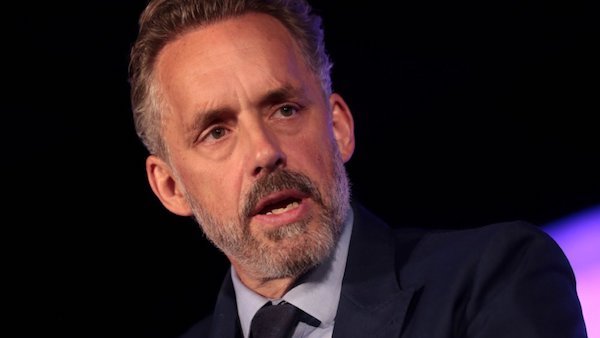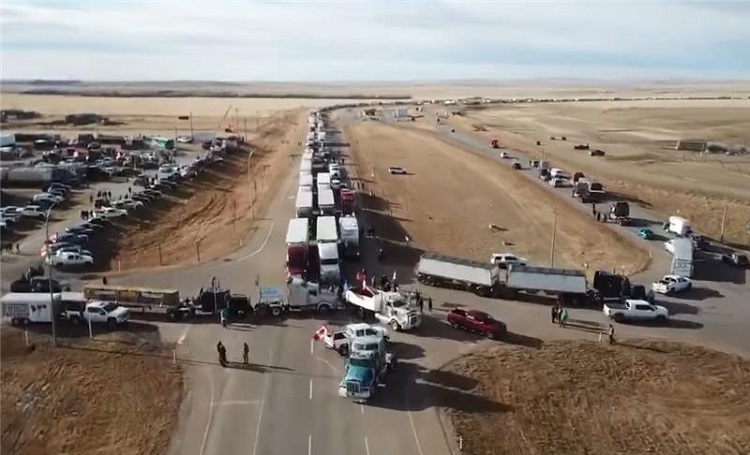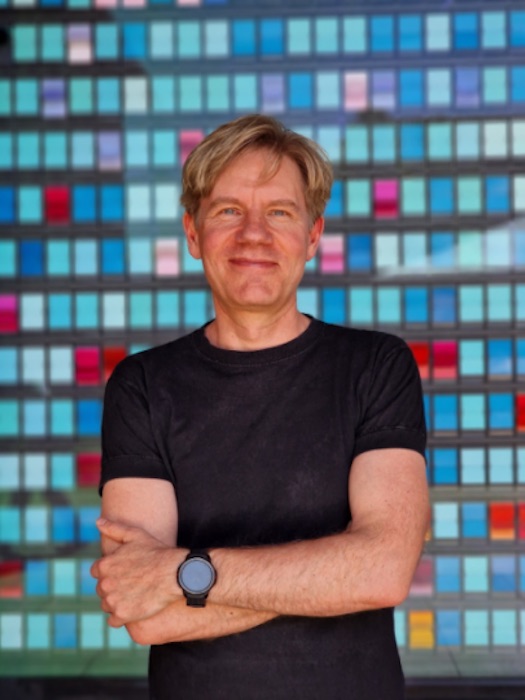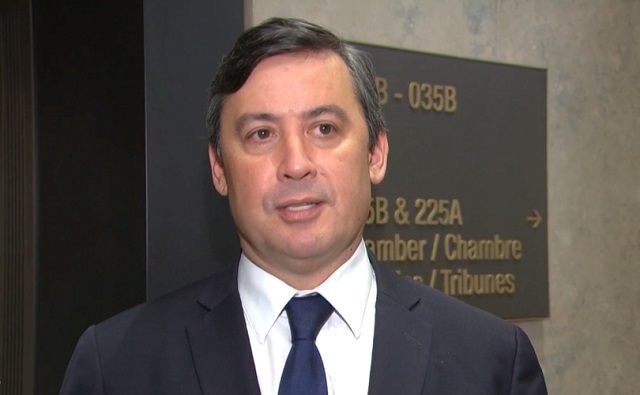COVID-19
Jordan Peterson calls on Premiers Moe, Kenney, Ford, and Opposition Leader Erin O’Toole to demand an end to the covid pandemic

Jordan Peterson is often described as Canada’s leading intellectual mind. Over the last five years, the clinical psychologist, Youtube personality, and author has become a highly sought after speaker and world famous commentator. Following his recovery from a serious health issue Peterson has just started a world tour called “Beyond Order”.
Having started that tour in Florida this week, Peterson has been watching the recent protests in Ottawa and around the country. He took a few moments to send a message to Canadians and particularly to Canada’s leading Conservative politicians.
Alberta
Coutts Three verdict: A warning to protestors who act as liaison with police

From the Frontier Centre for Public Policy
By Ray McGinnis
During the trial numbers of RCMP officers conceded that the Coutts Three were helpful in their interactions with the law. As well, there didn’t seem to be any truth to the suggestion that Van Huigenbos, Van Herk and Janzen were leaders of the protest.
Twelve jurors have found the Coutts Three guilty of mischief over $5,000 at a courthouse in Lethbridge, Alberta. Marco Van Huigenbois, Alex Van Herk and George Janzen will appear again in court on July 22 for sentencing.
Van Huigenbois, Van Herk and Janzen were each protesting at the Coutts Blockade in 2022. A blockade of Alberta Highway 4 began on January 29, 2022, blocking traffic, on and off, on Alberta Highway 4 near the Coutts-Sweetgrass Canada-USA border crossing. The protests were in support of the Freedom Convoy protests in Ottawa.
Protests began due to the vaccine mandates for truckers entering Canada, and lockdowns that bankrupted 120,000 small businesses. Government edicts were purportedly for “public health” to stop the spread of the C-19 virus. Yet the CDC’s Dr. Rachel Wallensky admitted on CNN in August 2021 the vaccine did not prevent infection or stop transmission.
By February 2022, a US court forced Pfizer to release its “Cumulative Analysis of Post-Authorization Adverse Event Reports” revealing the company knew by the end of February, 2021, that 1,223 people had a “case outcome” of “fatal” as a result of taking the companies’ vaccine.
On the day of February 14, 2022, the three men spoke to Coutts protesters after a cache of weapons had been displayed by the RCMP. These were in connection with the arrest of the Coutts Four. Van Huigenbos and others persuaded the protesters to leave Coutts, which they did by February 15, 2022.
During the trial numbers of RCMP officers conceded that the Coutts Three were helpful in their interactions with the law. As well, there didn’t seem to be any truth to the suggestion that Van Huigenbos, Van Herk and Janzen were leaders of the protest.
RCMP officer Greg Tulloch testified that there were a number of “factions” within the larger protest group. These factions had strong disagreements about how to proceed with the protest. The Crown contended the Coutts Three were the leaders of the protest.
During his testimony, Tulloch recalled how Van Huigenbos and Janzen assisted him in getting past the “vehicle blockade to enter Coutts at a time during the protest when access to Coutts from the north via the AB-4 highway was blocked.” Tulloch also testified that Janzen and Van Huigenbos helped with handling RCMP negotiations with the protesters. Tulloch gave credit to these two “being able to help move vehicles at times to open lanes on the AB-4 highway to facilitate the flow of traffic in both directions.”
During cross examination by George Janzen’s lawyer, Alan Honner, Tulloch stated that he noticed two of the defendants assisting RCMP with reopening the highway in both directions. Honner said in summary, “[Marco Van Huigenbos and George Janzen] didn’t close the road, they opened it.”
Mark Wielgosz, an RCMP officer for over twenty years, worked as a liaison between law enforcement and protesters at the Coutts blockade. Taking the stand, he concurred that there was sharp disagreement among the Coutts protesters and the path forward with their demonstration. Rebel News video clips “submitted by both the Crown and defence teams captured these disagreements as demonstrators congregated in the Smuggler’s Saloon, a location where many of the protesters met to discuss and debate their demonstration.” Wielgosz made several attempts to name the leaders of the protest in his role as a RCMP liaison with the protesters, but was unsuccessful.”
However, the Crown maintained that the protest unlawfully obstructed people’s access to property on Highway 4.
Canada’s Criminal Code defines mischief as follows in Section 430:
Every one commits mischief who willfully
(a) destroys or damages property;
(b) renders property dangerous, useless, inoperative or ineffective;
(c) obstructs, interrupts or interferes with the lawful use, enjoyment or operation of property; or
(d) obstructs, interrupts or interferes with any person in the lawful use, enjoyment or operation of property.
Robert Kraychik reported that “RCMP Superintendent Gordon Corbett…cried (no comment on the sincerity of this emoting) while testifying about a female RCMP officer that was startled by the movement of a tractor with a large blade during the Coutts blockade/protest.” This was the climax of the trial. A tractor moving some distance away from an officer in rural Alberta, with blades. The shock of it all.
No evidence was presented in the trial that Van Huigenbos, Van Herk and Janzen destroyed or damaged property. Officers testified they couldn’t identify who the protest leaders were. They testified the defendants assisted with opening traffic lanes, and winding down the protest.
By volunteering to liaise with the RCMP, the Crown depicted the Coutts Three as the protest leaders. Who will choose to volunteer at any future peaceful, non-violent, protest to act as a liaison with the policing authorities? Knowing of the verdict handed down on April 16, 2024, in Lethbridge?
Ray McGinnis is a Senior Fellow with the Frontier Centre for Public Policy. His forthcoming book is Unjustified: The Emergencies Act and the Inquiry that Got It Wrong.
COVID-19
CDC Quietly Admits to Covid Policy Failures

From the Brownstone Institute
BY
Instead of admitting policy error that the Covid vaccines do not much control virus spread, our public health administration doubled down, attempting then to compel vaccination on as many more people as could be threatened by mandates.
In so many words—and data—CDC has quietly admitted that all of the indignities of the Covid-19 pandemic management have failed: the masks, the distancing, the lockdowns, the closures, and especially the vaccines; all of it failed to control the pandemic.
It’s not like we didn’t know that all this was going to fail, because we said so as events unfolded early on in 2020, that the public health management of this respiratory virus was almost completely opposite to principles that had been well established through the influenza period, in 2006. The spread of a new virus with replication factor R0 of about 3, with more than one million cases across the country by April 2020, with no potentially virus-sterilizing vaccine in sight for at least several months, almost certainly made this infection eventually endemic and universal.
Covid-19 starts as an annoying, intense, uncomfortable flu-like illness, and for most people, ends uneventfully 2-3 weeks later. Thus, management of the Covid-19 pandemic should not have relied upon counts of cases or infections, but on numbers of deaths, numbers of people hospitalized or with serious long-term outcomes of the infection, and of serious health, economic, and psychological damages caused by the actions and policies made in response to the pandemic, in that order of decreasing priorities.
Even though numbers of Covid cases correlate with these severe manifestations, that is not a justification for case numbers to be used as the actionable measure, because Covid-19 infection mortality is estimated to range below 0.1% in the mean across all ages, and post-infection immunity provides a public good in protecting people from severe reinfection outcomes for the great majority who do not get serious “long-Covid” on first infection.
Nevertheless, once the Covid-19 vaccines were rolled out, with a new large wave of the Delta strain spreading across the US in July-August 2021 even after eight months of the vaccines taken by half of Americans, instead of admitting policy error that the Covid vaccines do not much control virus spread, our public health administration doubled down, attempting then to compel vaccination on as many more people as could be threatened by mandates. That didn’t work out too well as seen when the large Omicron wave hit the country during December 2021-January 2022 in spite of some 10% more of the population getting vaccinated from September through December of 2021.
A typical mandate example: in September 2021, Washington Governor Jay Inslee issued Emergency Proclamation 21-14.2, requiring Covid-19 vaccination for various groups of state workers. In the proclamation, the stated goal was, “WHEREAS, COVID-19 vaccines are effective in reducing infection and serious disease, and widespread vaccination is the primary means we have as a state to protect everyone…from COVID-19 infections.” That is, the stated goal was to reduce the number of infections.
What the CDC recently reported (see chart below), however, is that by the end of 2023, cumulatively, at least 87% of Americans had anti-nucleocapsid antibodies to and thus had been infected with SARS-CoV-2, this in spite of the mammoth, protracted and booster-repeated vaccination campaign that led to about 90% of Americans taking the shots. My argument is that by making policies based on number of infections a higher priority than ones based on the more serious but less common consequences of both infections and policy damages, the proclaimed goal of the vaccine mandate to reduce spread failed in that 87% of Americans eventually became infected anyway.

In reality, neither vaccine immunity nor post-infection immunity were ever able fully to control the spread of the infection. On August 11, 2022, the CDC stated, “Receipt of a primary series alone, in the absence of being up to date with vaccination* through receipt of all recommended booster doses, provides minimal protection against infection and transmission (3,6). Being up to date with vaccination provides a transient period of increased protection against infection and transmission after the most recent dose, although protection can wane over time.” Public health pandemic measures that “wane over time” are very unlikely to be useful for control of infection spread, at least without very frequent and impractical revaccinations every few months.
Nevertheless, infection spread per se is not of consequence, because count of infections is not and should not have been the main priority of public health pandemic management. Rather, the consequences of the spread and the negative consequences of the policies invoked should have been the priorities. Our public health agencies chose to prioritize a failed policy of reducing the spread rather than reducing the mortality or the lockdown and school and business closure harms, which led to unnecessary and avoidable damage to millions of lives. We deserved better from our public health institutions.
Republished from the author’s Substack
-

 COVID-1910 hours ago
COVID-1910 hours agoCDC Quietly Admits to Covid Policy Failures
-

 COVID-1913 hours ago
COVID-1913 hours agoJapanese study shows disturbing increase in cancer related deaths during the Covid pandemic
-

 Great Reset8 hours ago
Great Reset8 hours agoClimate expert warns against extreme ‘weather porn’ from alarmists pushing ‘draconian’ policies
-

 Alberta2 days ago
Alberta2 days agoDanielle Smith warns arsonists who start wildfires in Alberta that they will be held accountable
-

 National2 days ago
National2 days agoCanada’s Governor General slammed for hosting partisan event promoting Trudeau’s ‘hate speech’ bill
-

 Bruce Dowbiggin1 day ago
Bruce Dowbiggin1 day agoWhy Are Canadian Mayors So Far Left And Out Of Touch?
-

 Economy2 days ago
Economy2 days agoExtreme Weather and Climate Change
-

 International1 day ago
International1 day agoTelegram founder tells Tucker Carlson that US intel agents tried to spy on user messages




